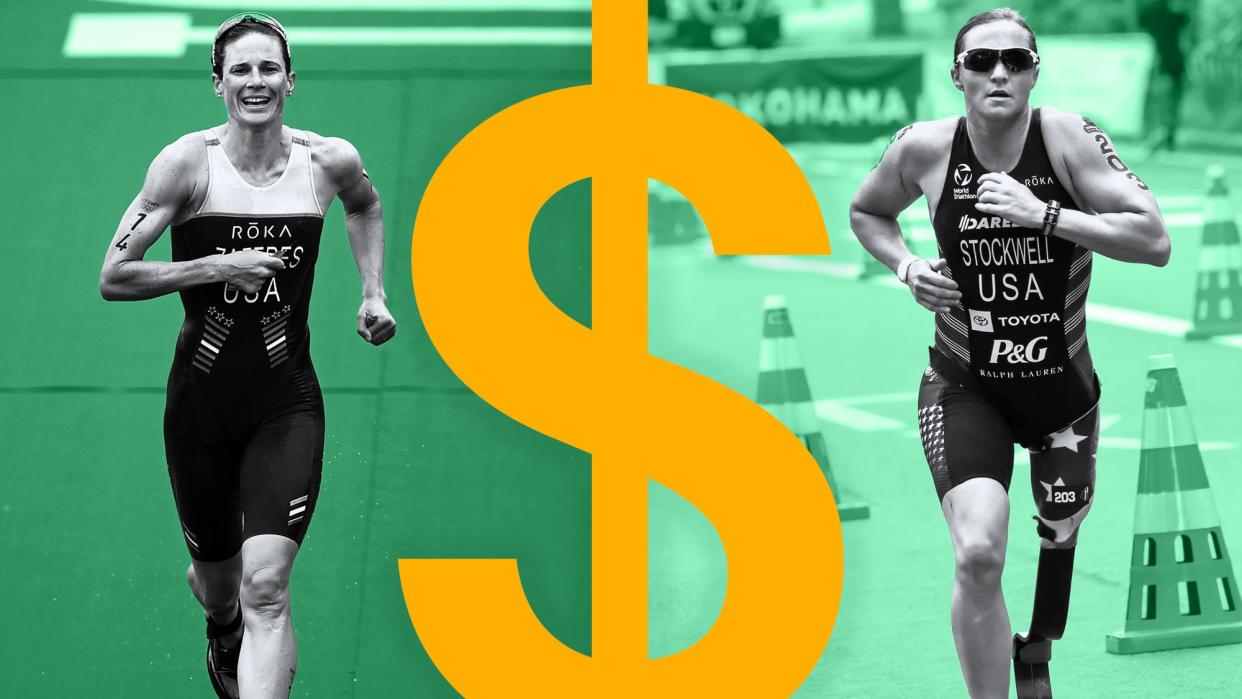U.S. Paralympians Will Finally Be Paid As Much As Olympians For Their Medals Won

Getty Images - Design: Alex Sandoval
This summer's Paralympic Games in Tokyo are just a few short weeks away, and for the first time, U.S. Paralympians will earn the same pay as their Olympic counterparts from the get-go.
Following the 2018 Winter Olympics in Pyeongchang, the United States Olympic & Paralympic Committee announced that both Olympians and Paralympians will receive equal payouts for medal performance. And so, the Paralympians who won medals during the 2018 Winter Games received a retroactive pay bump according to their hardware. This time around, however, the pay parity between all athletes will be implemented from the start, making the Tokyo Games even that much more momentous for Paralympic competitors.
Now, I know what you're thinking: Wait, Paralympians and Olympians earn money other than that from their sponsorships? Yes, yes, they do and it's all part of a program called "Operation Gold."
Essentially, American athletes are rewarded a certain amount of money from the USOPC for each medal they take home from the Winter or Summer Games. Previously, the program awarded Olympians $37,500 for each gold medal win, $22,500 for silver, and $15,000 for bronze. By comparison, Paralympic athletes received just $7,500 for each gold medal, $5,250 for silver, and $3,750 for bronze. During the Tokyo Games, however, both Olympic and Paralympic medalists will (finally) receive the same amount, earning $37,500 for each gold medal, $22,500 for silver, and $15,000 for bronze.
As I was reading this tears literally were streaming down my face not only bc of the equal pay for @Paralympics medals to @USParalympics athlete but the value and worth of Para athletes finally viewed equal to @Olympics. This is absolutely LIFE changing @TeamUSA thank you 🙏🏼 https://t.co/UIj17q1IuO
— Oksana Masters (@OksanaMasters) September 22, 2018
At the time of the initial announcement about the long-overdue change, Sarah Hirschland, the CEO of the USOPC, said in a statement: "Paralympians are an integral part of our athlete community and we need to ensure we're appropriately rewarding their accomplishments. Our financial investment in U.S. Paralympics and the athletes we serve is at an all-time high, but this was one area where a discrepancy existed in our funding model that we felt needed to change."
Recently, Russian-American athlete Tatyana McFadden, a 17-time Paralympic medalist, opened up about the pay change in an interview with The Lily, stating how it makes her feel "valued." "I know that sounds so sad to say," but earning equal pay makes the 32-year-old track and field athlete "feel like we're just like any other athlete, just like any Olympian." (Related: Katrina Gerhard Tells Us What It's Like to Train for Marathons In a Wheelchair)
Andrew Kurka, a Paralympic Alpine skier who is paralyzed from the waist down, told The New York Times in 2019 that the pay increase allowed him to purchase a home. "It's a drop in the bucket, we get it once every four years, but it makes a huge difference," he said.
All that being said, strides towards true equality for Paralympic athletes are still needed, with swimmer Becca Meyers being a prime example. Earlier this month, Meyers, who was born deaf and is also blind, withdrew from the Tokyo Games after being denied a personal care assistant. "I'm angry, I'm disappointed, but most of all, I'm sad not to be representing my country," Meyers wrote in an Instagram statement. Equal pay, however, is an undeniably important step toward closing the gap between Paralympians and Olympians.
Much like Olympic athletes, Paralympians gather from around the world every four years and compete after the Winter and Summer Olympics, respectively. There are currently 22 summer sports sanctioned by the International Paralympic Committee, including archery, cycling, and swimming, among others. With this year's Paralympic Games running from Wednesday, August 25 through Sunday, September 5, fans from across the globe can cheer on their favorite athletes knowing the winners are finally getting the pay they deserve.

